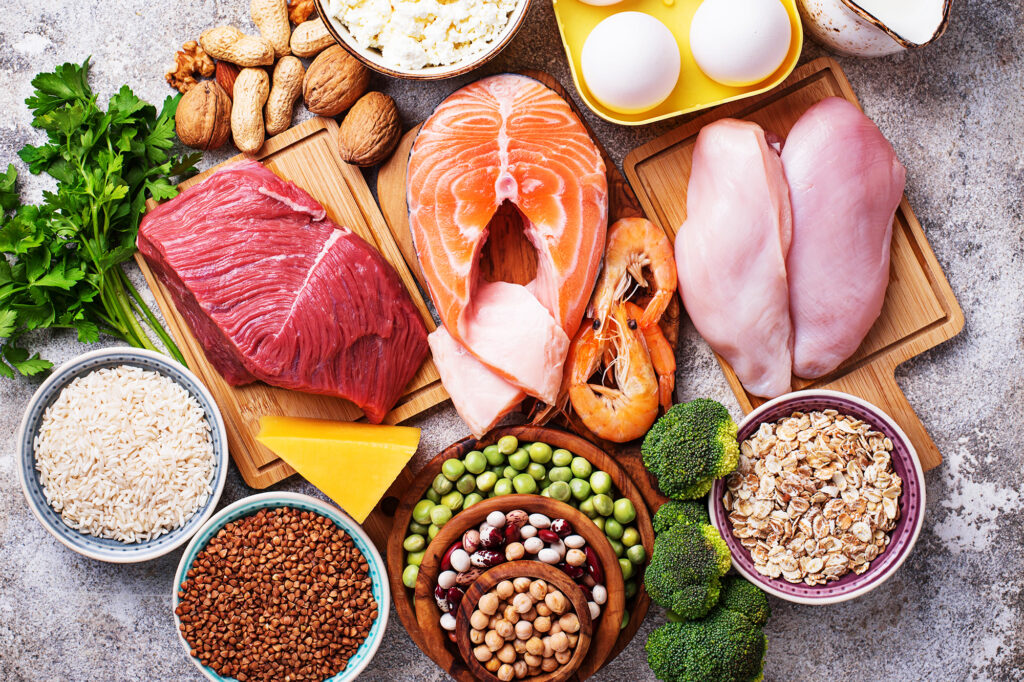Timeline Tales
Exploring the stories that shape our world, one timeline at a time.
Protein Paradise: Eating Your Way to Gains
Unleash muscle growth with mouthwatering protein-packed recipes and tips. Dive into Protein Paradise and transform your gains today!
Maximize Your Muscle: Understanding the Role of Protein in Strength Training
Maximize Your Muscle gains by understanding the pivotal role that protein plays in strength training. Protein is essential for repairing and building muscle tissues that are broken down during workouts. It provides the building blocks, known as amino acids, which are crucial for muscle recovery and growth. For optimal results, it is recommended that individuals engaging in strength training consume approximately 1.6 to 2.2 grams of protein per kilogram of body weight daily. This ensures your body has the necessary resources to repair and strengthen muscles post-exercise.
In addition to the quantity of protein, the timing of protein intake is equally important. Consuming a protein-rich meal or snack within 30 minutes to 2 hours after your workout can significantly enhance muscle recovery. Incorporate a variety of protein sources into your diet, such as lean meats, dairy, legumes, and plant-based options, to diversify your amino acid profile. Ultimately, understanding how to properly integrate protein into your strength training regimen can help you maximize your muscle-building efforts and achieve your fitness goals more effectively.

Top 10 Protein-Packed Foods to Fuel Your Fitness Journey
Fueling your fitness journey starts with a balanced diet, and protein-packed foods are essential for muscle repair and growth. To help you on this journey, we've compiled a list of the top 10 protein-packed foods that will keep your energy levels high and support your workout goals. Incorporating these foods into your meals can help you build strength and endurance while maintaining a healthy lifestyle.
- Chicken Breast: A staple for many athletes, chicken breast is low in fat and high in protein, making it ideal for muscle development.
- Eggs: Packed with essential amino acids, eggs are not only versatile but also an excellent source of protein.
- Greek Yogurt: This creamy delight is not just delicious but also offers double the protein of regular yogurt.
- Quinoa: A perfect choice for vegetarians, quinoa contains all nine essential amino acids.
- Black Beans: Rich in protein and fiber, black beans are perfect for improving digestion while fueling your body.
- Tuna: This fish is a quick and convenient option for a protein boost, loaded with omega-3 fatty acids.
- Tofu: A great protein source for plant-based diets, tofu absorbs flavors and complements many dishes.
- Lentils: These legumes are not only rich in protein but also packed with essential nutrients.
- Beef Jerky: A healthy snack choice, beef jerky is portable and provides a substantial protein punch.
- Cheese: Whether it's cottage cheese or cheddar, cheese is a tasty way to boost your protein intake.
Are You Getting Enough Protein? Signs You're Missing Out on Gains
Are you getting enough protein in your diet? Protein is essential for muscle repair and growth, and insufficient intake can lead to a range of issues that hinder your fitness goals. If you find yourself experiencing chronic fatigue, slower recovery times after workouts, or noticeable muscle loss, these could be warning signs that you're missing out on gains. The recommended daily allowance for protein varies based on factors like age, gender, and level of physical activity, but athletes may require significantly more to support their training needs.
Recognizing the signs of protein deficiency can help you adjust your diet and maximize your performance. Here are some indicators you might not be hitting your protein goals:
- Increased hunger, especially after meals
- Frequent sickness or slower healing from injuries
- Muscle weakness or decreased strength
By paying attention to these signals, you can make informed changes to your nutrition plan, ensuring you incorporate a variety of protein-rich foods such as lean meats, dairy products, legumes, and nuts to support your muscle growth and overall health.